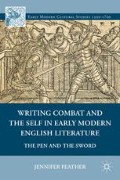Abstract
The previous chapter claims that while Vesalius presents a notion of body and self drawn from the classical tradition that ensures agent autonomy through objectification of the body either of the opponent or the corpse, his English imitators and Shakespeare’s Roman plays, influenced by a medieval English tradition, present a form of agency that understands combat as mutually constructive for both combatants and agency as relational. Vesalius’s depiction of the body begins to suggest the role violent, physical opposition plays in the construction of individual understandings of self. To elucidate how this process extends to the development of an English national sense of self, this chapter examines historical narratives, and especially moments when masculine codes of combat are appropriated by women, that illuminate the cultural differences at stake in these different modes of understanding combat in relationship to the self.
Nay, what if I prove plays to be no extreme, but a rare exercise of virtue? First, for the subject of them, (for the most part) it is borrowed out of our English chronicles, wherein our forefathers’ valiant acts (that have lain long buried in rusty brass and worm- eaten books) are revived, and they themselves raised from the grave of oblivion, and brought to plead their aged honors in open presence; than which what can be a sharper reproof to these degenerate, effeminate days of ours?
How would it have joyed brave Talbot, the terror of the French, to think that after he had lain two hundred years in his tomb he should triumph again on the stage, and have his bones new embalmed with the tears often thousand spectators at least (at several times), who in the tragedian that represents his person imagine they behold him fresh bleeding.
—Thomas Nashe, from “Pierce Penniless, His Supplication to the Devil” 1
Access this chapter
Tax calculation will be finalised at checkout
Purchases are for personal use only
Preview
Unable to display preview. Download preview PDF.
Notes
Thomas Nashe, The Works of Thomas Nashe, ed. Ronald B. McKerrow (Oxford: Basil Blackwell, 1958), 1:212.
Carolyn Williams, Boudica and Her Stories: Narrative Transformations of a Warrior Queen (Newark, NJ: University of Delaware Press, 2009), esp. 44–55.
Jean Howard and Phyllis Rackin, Engendering a Nation: A Feminist Account of Shakespeare’s English Histories (New York: Routledge, 1997).
Ania Loomba, Shakespeare, Race, and Colonialism (New York: Oxford University Press, 2002).
Mary Floyd-Wilson, English Ethnicity and Race in Early Modern Drama (New York: Cambridge University Press, 2003).
Thomas Elyot, A Critical Edition of Sir Thomas Elyot’s ‘The Boke Named the Govenour’” ed. Donald W. Rude (New York: Garland Publishing, 1992), esp. 226–36.
Annabel Patterson, Reading Holinshed’s Chronicles (Chicago: The University of Chicago Press, 1994), 104–5.
Thomas Laqueuer, Making Sex: Body and Gender from the Greeks to Freud (Cambridge, MA: Harvard University Press, 1990).
Anthony Fletcher, Gender, Sex, and Subordination 1500–1800 (New Haven: Yale University Press, 1995).
Laura Levine, Men in Women’s Clothing: Anti-theatricality and Effeminization, 1579–1642 (New York: Cambridge University Press, 1994).
Christian Billings, Masculinity, Corporality, and the English Stage 1580–1635 (Burlington, VT: Ashgate, 2008).
Ann Rosalind Jones and Peter Stallybrass, Renaissance Clothing and the Materials of Memory (New York: Cambridge UP, 2000), esp. 71–2.
Marie Axton, The Queen’s Two Bodies: Drama and the Elizabethan Succession (London: Royal Historical Society, 1977), 12.
Simone Weil, The Iliad Or The Poem of Force, (Wallingford, PA: Pendle Hill, 1956).
Elaine Scarry, The Body in Pain: The Making and Unmaking of the World (New York: Oxford University Press, 1985).
Susan Brison, Aftermath: Violence and the Remaking of the Self (Princeton: Princeton University Press, 2002).
Richard Sugg, Murder After Death: Literature and Anatomy in Early Modern England (Ithaca, NY: Cornell University Press, 2007).
David Hillman, Shakespeare’s Entrails: Belief, Scepticism, and the Interior of the Body (Basingstoke, Hampshire: Palgrave Macmillan, 2007).
Coppelia Kahn, Roman Shakespeare (New York: Routledge, 1997).
Igor Djordjevic, Holinshed’s Nation: Ideals, Memory, and Practical Policy in the (Burlington, VT: Ashgate, 2010), 22–3.
Lister M. Matheson, The Prose Brut: The Development of a Middle English Chronicle (Tempe, AZ: Medieval and Renaissance Texts and Studies, 1998).
Fred Jacob Levy, Tudor Historical Thought (San Marino, CA: Huntington Library, 1967), 287.
Andrew Hadfield, Shakespeare, Spenser, and the Matter of Britain (New York: Palgrave, 2004), esp. 92.
William Ian Miller, The Mystery of Courage (Cambridge, MA: Harvard University Press, 2000), 19.
Copyright information
© 2011 Jennifer Feather
About this chapter
Cite this chapter
Feather, J. (2011). “A Sharper Reproof to These Degenerate Effeminate Days”. In: Writing Combat and the Self in Early Modern English Literature. Early Modern Cultural Studies. Palgrave Macmillan, New York. https://doi.org/10.1057/9781137010414_3
Download citation
DOI: https://doi.org/10.1057/9781137010414_3
Publisher Name: Palgrave Macmillan, New York
Print ISBN: 978-1-349-29860-0
Online ISBN: 978-1-137-01041-4
eBook Packages: Palgrave Literature CollectionLiterature, Cultural and Media Studies (R0)

